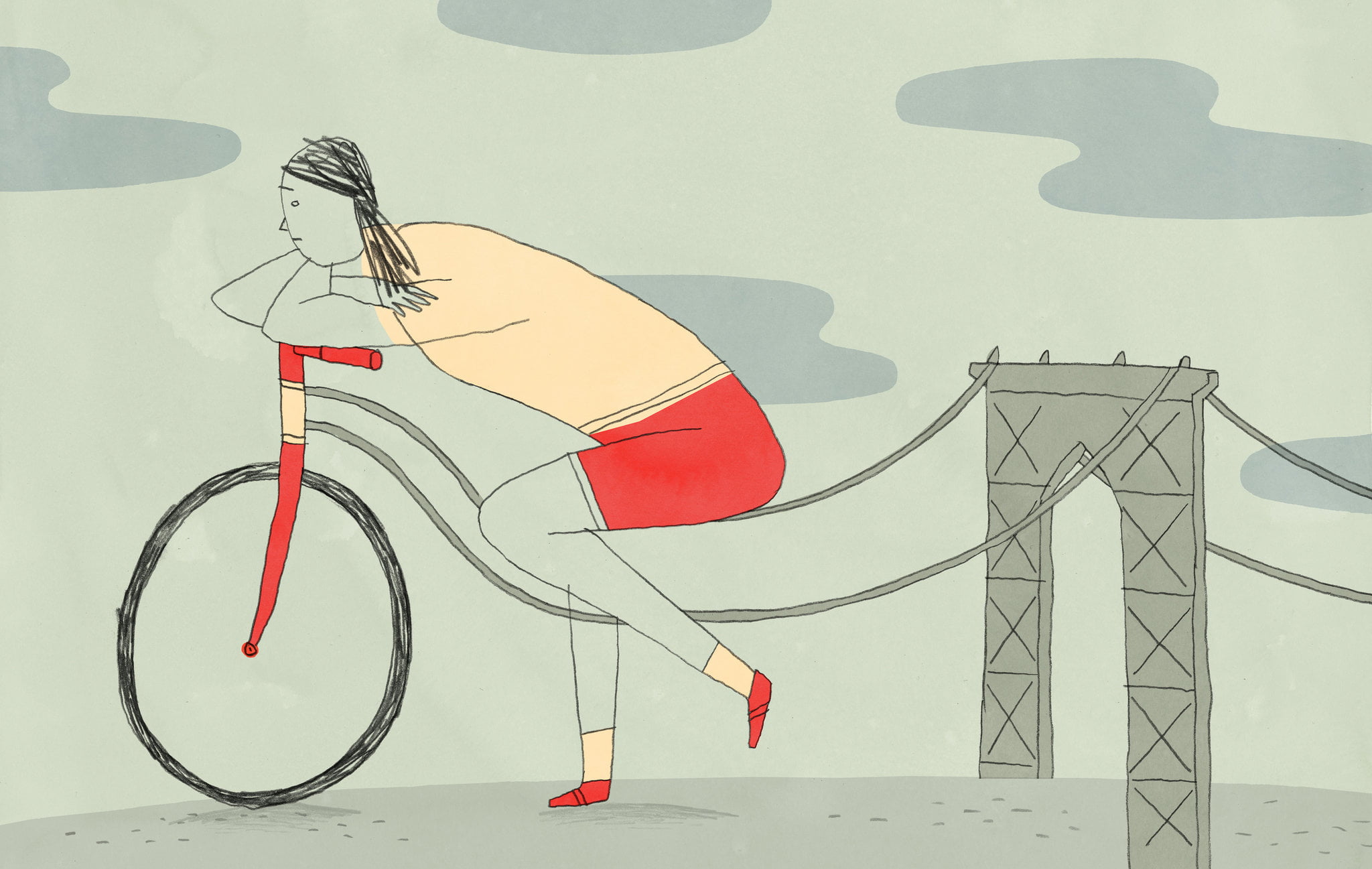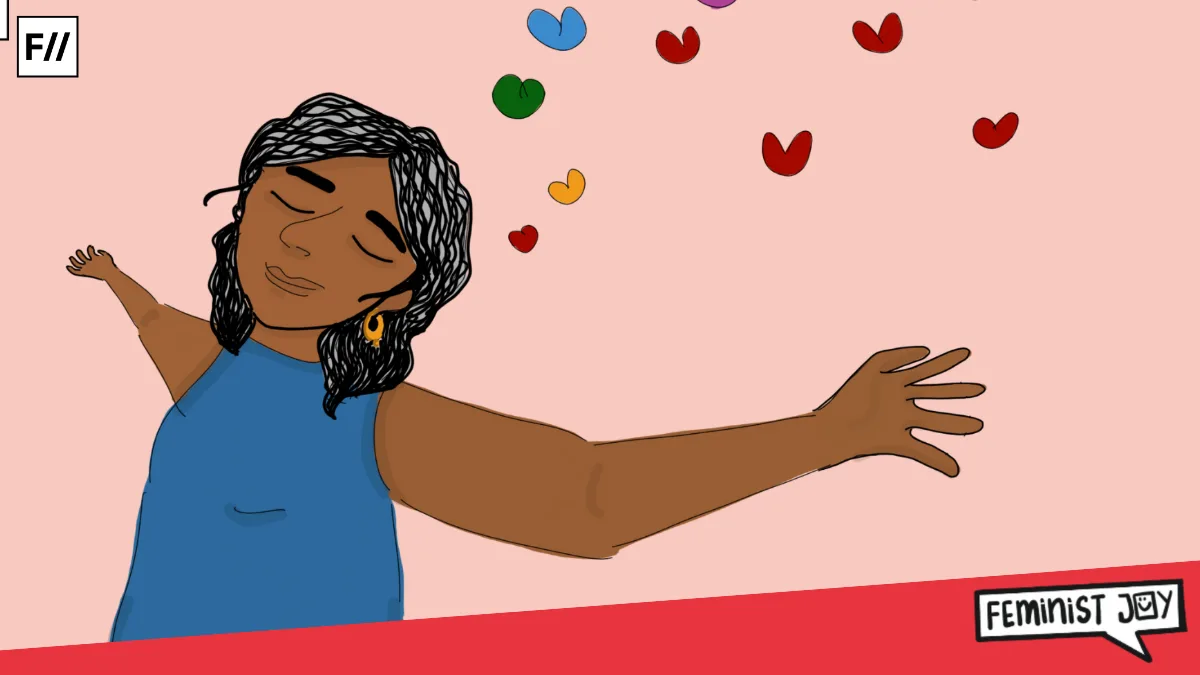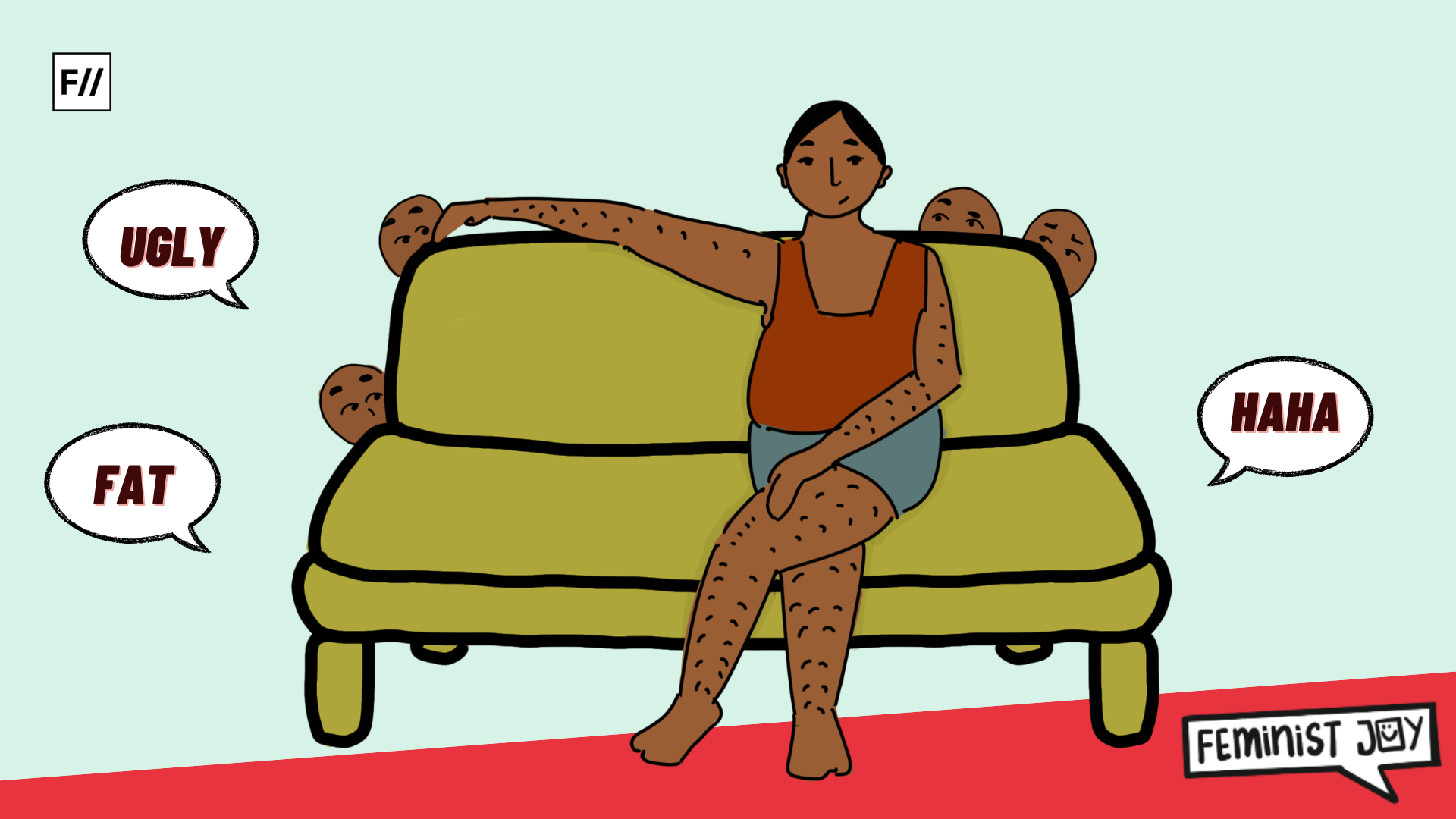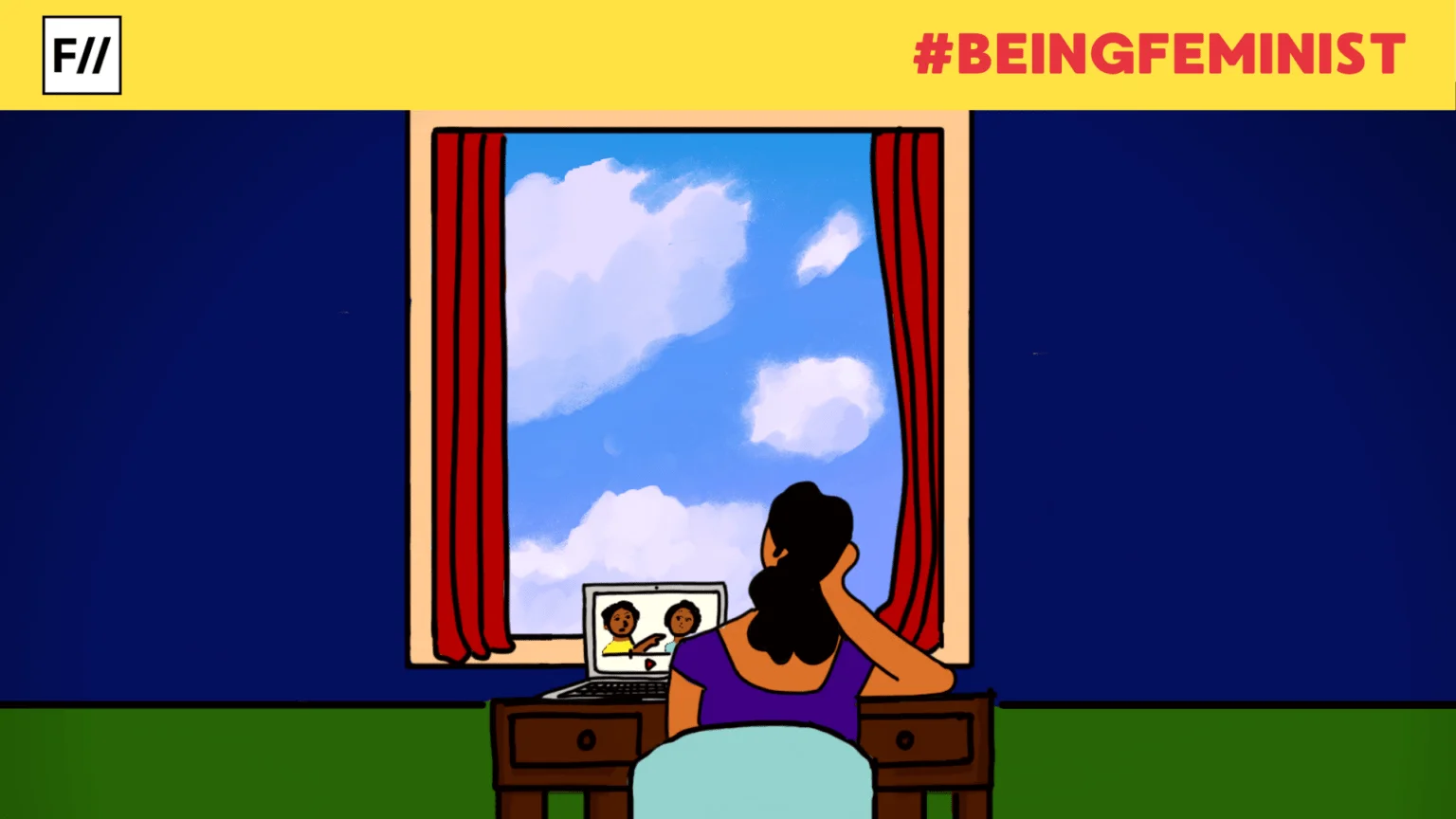Editor’s Note: FII’s #MoodOfTheMonth for January, 2022 is Our Evolving Relationship With Feminism. We invite submissions on the many changing aspects of the feminist discourse, throughout the month. If you’d like to contribute, kindly email your articles to sukanya@feminisminindia.com
Trigger warning: Mention of intimate partner violence, death by suicide
Nine years ago, I lived in a big, white house in the most perfect hill town in the Southeast Asian highlands. It had a tiled roof and stood on a hillock surrounded by pine trees, amidst dappled spots of sunlight. That was the happiest I was going to be for a long time. I just didn’t know it at the time.
The garden was a techno-fairyland, with pools of goldfish and an electric waterfall that ran crisscross through its middle. If you sat still for long enough, you would see the fish dart and chase each other around rocks and weeds. The grass was always well tended, but I don’t think I ever walked on it barefoot. I can’t remember why.
I now wish I had spent more time in that garden. I wish I had joined him when he spent long Sunday mornings there with the dogs. I remember him like that, in his faded blue sweatshirt and nerdy-hot glasses. Contorting himself into various positions with the flexibility of a yogic circus clown, while the dogs tried to jump over and under him. Mornings would begin with him calling out to me as soon as he woke, in the nuttiest, mangled corruption of my name that only he could have thought of.
That boy died one day. Perhaps extinguished is a better word. The boy that I adored was extinguished. Put out like a candle flame pinched between two fingers. It is in the smoky, acrid fumes that remained that we would spend the next five years. With the benefit of hindsight, I know that if your partner’s parent dies by suicide as a final act of protest against your union, pay heed.
When caste norms that dictate who is allowed to marry whom is more deeply ingrained than the primordial instinct to survive, bow out gracefully with some semblance of your sanity intact, because that is not a battle you can win. Something like that corrodes the soul. It eats up a person from the inside until what you have left is the hollow shell of the person you used to love.
I couldn’t possibly abandon him, because he was also immensely caring on his good days. Like the time he drove a hundred kilometers across the hills to come get me because I was anxious about getting a bus home. And so, I lived in a daze, unsure of which version of my husband I was going to get each day

It started almost imperceptibly – frequent mood swings that you would expect of a grieving son. I overlooked the seemingly good-natured teasing, despite the hint of cruelty. But soon, minor disagreements would send him into a screaming eruption. An interruption to his morning by a fruit seller who rang the doorbell made him drive his fist into a wall.
He enjoyed taunting me. His favourite was that I would die alone, unwanted and unloved. That I was a temptress, constantly vying for the attention of the paramours he imagined I had. ‘Just wait a few more years. All these men won’t even look at you then. Then we’ll see’.
Eventually, I began to believe him. I was a disgrace, an embarrassment to him. I wished I could take a hard brush and scrub my life clean enough to be deemed worthy by him. I began to wish I had stayed a virgin for him—for the person who had said, in one of his fits of rage, that I must have enjoyed being fingered by an older man as an 11-year-old. When I rode pillion with him during a bad mood, he would rain abuses, knowing he had me trapped.
He delighted in riding recklessly so that he could elicit a scream from me, even at the cost of crashing the motorbike, and injuring ourselves. When I had a nervous breakdown and was advised time off work, he screamed at me for using mental health as an excuse to shirk adult responsibilities. When I had sex with him, it was in the hope that it would make him less angry. He took me, if not violently, then callously, with a disregard so dehumanising that I would cry through it. Quietly, because if he found me crying, he would mock me. “Don’t make me feel like I am raping you“.
Also read: Moving On: Transforming Grudges Into Self-Awareness When Relationships Fail

The first time he called me a whore in public, I sobbed as I drove home, and resolved to end things. But then he begged to be forgiven, and I could not bring myself to refuse, even though I knew that the abuse was growing, in more insidious ways. One afternoon, he screamed in my ear while I lay cowering on the bed, waiting for a blow that never came, after which I had to pick him up and soothe him because by then he had slid to the floor, sobbing uncontrollably.
I couldn’t possibly abandon him, because he was also immensely caring on his good days. Like the time he drove a hundred kilometers across the hills to come get me because I was anxious about getting a bus home. And so, I lived in a daze, unsure of which version of my husband I was going to get each day.
Did he ever blame me for his father dying by suicide? Perhaps not in as many words. But there were days when he wailed in the shower, banging the floor with his fists in despair, begging forgiveness from his dead father for having chosen me for a partner. In time, of course, he found a million ways to punish me.
I am now beating a path back to myself. Divorce hadn’t been enough. It would need an exorcism. When I reached to look for that familiar ball of pain, it was nearly gone. What remained was still in the same place, but lighter and more diffused. A diminished version of the pain, perhaps because it was now me who was inflicting it. I live in this state of semi-pain now. It’s not unbearable, but not entirely comfortable either. I have to be watchful so that I do not feed it. So that I can end the cycle of hurt. And whatever else I do – read or work or sing – this pain piece continues to be lodged in my chest
The threat of abandonment was a particular favourite. I would get on my knees to beg him not to. If I said terrible things to hurt him back, he would withdraw his affection. If I tried to reason with him, he would twist every sentence around so that I didn’t know in the end what I had really meant to say. What if he was right? Maybe it was all my fault. Perhaps it was indeed because I provoked him.
The final night before I left him, I locked the door to the guest bedroom into which I had moved, because I was mortally afraid. Of what, I could not articulate. That was a few days after he had publicly abused me in a crowded train station. “You’re insane, you know that? Do you really think I’ll have a child with you?” Months of adoption paperwork I had done, unraveled over a disagreement about a household chore.

Towards the final years of our marriage, I had what felt like a hard rubber ball lodged in the right side of my chest, a little below the throat. I encountered it during my meditation practice, and was given professional advice on how to observe it and let it dissipate. I tried, but instead it nestled deeper.
It seemed to possess no intention to leave. It wasn’t something that actively bothered me, except it felt malevolent somehow. Malignant. I continued to feel it for months even after I left him. But sometime after that, I lost track of it, because I had discovered ways to look away from my pain. I found comfort in the affections of strangers, fickle as it was.
In time, I met a kind man who, in gently asking about my past, navigated some of the most difficult memories with me. When I wept over a repressed incident, he held me and soothed me. But it wasn’t enough. Every time I opened my mouth, the boy tumbled out of it.
Also read: Dating A Misogynist: Lessons In Self-Worth And Drawing Healthy Boundaries
In almost the exact phrases that had been used to diminish me, I chided this man for talking about his fears. I picked fights over trivialities and then completely froze up, refusing to speak until he pleaded with me. Everything that was done to me, I paid it forward to a total innocent. Down to furtively keeping an earlier dalliance going.
I am now beating a path back to myself. Divorce hadn’t been enough. It would need an exorcism. When I reached to look for that familiar ball of pain, it was nearly gone. What remained was still in the same place, but lighter and more diffused. A diminished version of the pain, perhaps because it was now me who was inflicting it. I live in this state of semi-pain now. It’s not unbearable, but not entirely comfortable either. I have to be watchful so that I do not feed it. So that I can end the cycle of hurt. And whatever else I do – read or work or sing – this pain piece continues to be lodged in my chest.

There are times I forget about it. When I am completely absorbed in a task. Or when I am laughing ecstatically with a friend. But it never ever truly goes away.
What I strive for now is acceptance. Acceptance of the loss of the boy I had once loved. That in the end, between him and me, I had picked me. In the meantime, the hope is that I heal, although I do not know how. Perhaps it will be like learning to ride a bicycle. Like that little flash of time when the weeks of wobbling turns into a moment of crystal clarity, and in those glorious seconds we find the balance that we were struggling for. And it seems so obvious that we delight in the effortlessness of it.
No one really knows why it is in that moment we find that elusive balance. We only know when we do. There is a sort of peace that accompanies that realisation. And that is enough for now.
Mridula is a PhD Scholar working on political ecology and health in India at the University of Northumbria, Newcastle, UK. She is a lawyer and environmental policy specialist, with a degree in Development Studies from the University of Oxford
Featured Image Source: The New York Times




